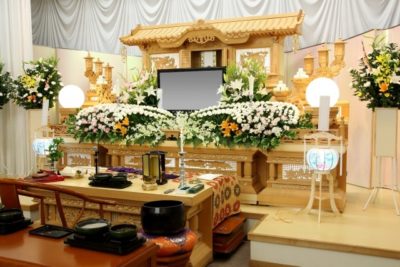A funeral is held in Buddhist style in Japan. As you know, Japan has two major religions, Shinto and Buddhism. The interesting thing is that people get married at the Shinto Shrines or in Shinto style, but people hold funerals at the Buddhist temple or in the Buddhist style. For happy occasions, people go to Shinto Shrine for a wedding, after having a baby, for the children’s blessing, etc. But there is no image of the after-life. In Buddhism, there is a paradise. people believe that they can go to paradise if they spend life honestly and sincerely after they finish their life.


Funeral Operating Company
If your family member dies, you can call the funeral operating company, who will arrange everything. The place of the ceremony, crematorium, monks, photos of the deceased, flowers, meals for the guests, and so on. It costs a lot, the average fee for the ceremony is about 2 million yen (20,000 USD). If you live in an independent house, you may hold the ceremony at home, but if not, you should use the ceremony hall which is specialized in the funeral.
The Wake
The ceremony consists of two parts. One is a wake. The family members are supposed to stay awake all night long next to the dead who is in the coffin. The reason why they operate this ceremony is that the dead might come back to life. It is said it actually happened a long time ago when the autopsy examination was not accurate.
But if you are a friend, colleague, or distant relative of the dead and attend the ceremony, you don’t need to stay all night long. The ceremony takes place in the evening. You wear a black suit for the man and a black dress or kimono for the woman and bring condolence money put in the special envelope called “Koden-bukuro香典袋”. Koden literally means money for the incense. The amount depends on the relationship and your age. If you are a friend or colleague of the dead or of the family, you may bring about 5,000 yen (50 USD). This money will help the family who holds the ceremony.
When you arrive at the site, you write your name and give the money envelope at the reception. Then in front of the altar, place powder incense on the burning charcoal and put two hands together and pray for the soul of the dead to peacefully leave this world while a Buddhist monk is chanting the sutra.
Then you are invited to the dinner. The family ordered sushi or sandwiches and drinks. You are welcome to talk about the dead. It is a console for the dead and for the family members.
When you leave the hall, you will receive a small gift like a handkerchief and salt. Salt is used to purify just before entering your house, otherwise, the dead soul might follow you into your house.
Farewell Service
The following day, they hold farewell service at the same place. You can attend both, wake and farewell, or just one of them depending on the relationship with the dead. But the farewell service is normally during the daytime, so you don’t have to worry even if you cannot attend.
It is similar to the wake. You offer powdered incense while the monk is chanting a sutra. After the service, the coffin is brought into the special funeral car which looks like a small house. The car is going to the crematorium.
Cremation
Only family members, close relatives, and close friends attend the cremation. After watching the body put into the oven, you wait in the waiting room until the body becomes bones and ashes. Then members go to see them. Two of the family members catch the bones together using the special chopsticks and put them in the urn, then change to the next two persons.
Ensepulcher
After the cremation, the family brings the urn to the grave. The grave is sometimes in the precinct of the temple and sometimes in the public cemetery. If your other family members are already in the grave, you put the urn under the same gravestone. One grave may have several spaces for the urns. If you make a new grave, you have to rent permanently the space and buy the gravestone with the name of the family.
Forty-Ninth Day Ceremony
The dead must have judgment every seven days before having a final decision after seven weeks if he or she can go to paradise. The family holds a 49th-day ceremony praying for the soul to become Buddha and go to paradise.
Requital
After the 49th day ceremony, the family sends gifts to the participants of the funeral. It is normally the half price of the condolence money. If you receive 10,000 yen, you are supposed to give 5,000 yen-value gifts. Recently, to avoid giving unnecessary items, it is popular to send a gift catalog and ask the participants to choose from it.

